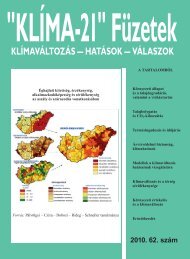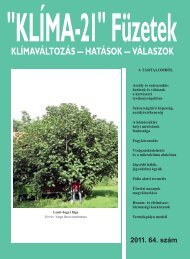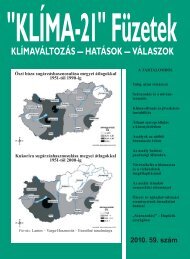KLÃMA-21 Füzetek 61. szám - VAHAVA Hálózat
KLÃMA-21 Füzetek 61. szám - VAHAVA Hálózat
KLÃMA-21 Füzetek 61. szám - VAHAVA Hálózat
Create successful ePaper yourself
Turn your PDF publications into a flip-book with our unique Google optimized e-Paper software.
„KLÍMA-<strong>21</strong>” FÜZETEK: KLÍMAVÁLTOZÁS – HATÁSOK – VÁLASZOK 187<br />
The need to act to prevent increasing losses caused by the extremes, as well as the uncertainties<br />
together determine the tasks for water management, in line with the National Climate<br />
Change Strategy as well as the directives and recommendations of the Community (Water<br />
Framework Directive, Flood Directive, Statement on Drought):<br />
– Short-term measures which can be implemented despite the uncertainties are especially<br />
important, as they are effective in reducing losses, entail acceptable costs, and are not called<br />
for solely due to the current and expected effects of climate change. The sustainable solution<br />
lies in the coordinated handling of flooding, high water table and drought (using various water<br />
retention methodologies), as well as in supporting the adaptation of land use to the water<br />
management considerations.<br />
– Climate impact studies should be integrated into the water management planning processes<br />
(including the preliminary planning of measures to be implemented on a longer term).<br />
The most important tasks include reduction of the significant lack of information on the effects<br />
of climate change on water management; identification and monitoring of the climate<br />
change sensitive indicators; supporting the relevant R+D activities; and strengthening international<br />
cooperation.<br />
– Finally, preparation for the longer-term consequences of aridification for water management<br />
– i.e. an appreciable reduction of water reserves and increasingly severe droughts – is<br />
another priority task. It is desirable to draw up plans adapted to the (uncertainly) forecast<br />
extent of climate change, to be implemented if the indicators identified reach the limit values<br />
indicating the need for intervention.<br />
SOME AGROCLIMATIC ASPECTS OF RAINWATER,<br />
WATER RESOURCES AND WATER USE<br />
By<br />
TŐKEI, LÁSZLÓ – JUHOS, KATALIN<br />
Keywords: water resources, water balance, rainwater, water usage, irrigation.<br />
The often extreme distribution of rainfall can cause unfavourable water balance situations.<br />
We are not only sufferers of the impacts of hydrological changes, but also affect such<br />
changes through land use. The definition of the lack or abundance of water is relative and<br />
depends very much on the amount of water needed, including water required for agricultural<br />
production. We should give adequate answers – dynamic in time and space – using special<br />
mathematical as well as practical approaches. The answers must include the rational use of<br />
available moisture and its preservation in the soil, not only in cultivated areas but in the entire<br />
ecological system.






